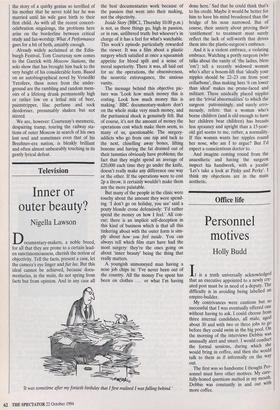Television
Inner or outer beauty?
Nigella Lawson
Documentary-makers, a noble breed, for all that they are prone to a certain lead- en sanctimoniousness, cherish the notion of objectivity. Tell the facts, present a case, let the camera's eye linger and fiat lux. But this ideal cannot be achieved, because docu- mentaries, in the main, do not spring from facts but from opinion. And in any case all the best documentaries work because of the passion that went into their making, not the objectivity.
Inside Story (BBC1, Thursday 10.00 p.m.) is not, as these things go, high in passion, or in raw, unfiltered truth: but whoever's in charge of it has a feel for what's watchable. This week's episode particularly rewarded the viewer. It was a film about a plastic surgery which satisfied at once a squeamish appetite for blood spilt and a sense of moral superiority. There it was, all laid out for us: the operations, the obsessiveness, the neurotic extravagance, the anxious vanity.
The message behind this objective pic- ture was 'Look how much money this is costing. Look how much money this is making.' BBC documentary-makers don't on the whole make very much money, and the puritanical shock is genuinely felt. But of course, it's not the amount of money the operations cost which make them seem, to many of us, questionable. The surgery- addicts who go from one nip and tuck to the next, chiselling away bones, lifting bosoms and having the fat drained out of their tummies obviously have problems; the fact that they might spend an average of £20,000 each time they go under the knife, doesn't really make any difference one way or the other. If the operations were to cost 2p a throw, it certainly wouldn't make them any the more palatable.
But many of the people in the clinic were touchy about the amount they were spend- ing. 'I don't go on holiday, you see' said a pouty blonde crone defensively: 'I'd rather spend the money on how I feel.' All con- cur; there is an implicit self-deception in this kind of business which is that all this tinkering about with the outer form is sim- ply about how you feel inside. You can always tell which film stars have had the most surgery: they're the ones going on about 'inner beauty' being the thing that really matters.
A youngish =moneyed man having a nose job chips in: 'I've never been out of the country. All the money I've spent has been on clothes ... or what I'm having `It was sometime after my fortieth birthday that I first realised I was falling behind.' done here.' Sad that he could think that's to his credit. Maybe it would be better for him to have his mind broadened than the bridge of his nose narrowed. But of course, their anxiety about proving their `entitlement' to treatment must surely reflect the lack of self-worth that drives them into the plastic-surgeon's embrace.
And it is a violent embrace, a violating embrace. Watching a portly surgeon (who talks about the vanity of 'the ladies, bless 'em') tell a recently widowed woman who's after a bosom-lift that 'ideally your nipples should be 22-23 cm from your collarbone', thus making hers '6 cm lower than ideal' makes me prune-faced and militant. These unideally placed nipples are the 'trivial abnormalities' to which the surgeon patronisingly, and surely erro- neously, refers: that a woman who's borne children (and is old enough to have her children bear children) has breasts less sprauncy and upright than a 15-year- old girl seems to me, rather, a normality. If this woman wants her nipples round her nose, who am I to argue? But I'd expect a conscientious doctor to.
And imagine coming round from the anaesthetic and having the surgeon inspect his handiwork, with a jocular `Let's take a look at Pinky and Perky'. I think my objections are in the main aesthetic.










































































 Previous page
Previous page